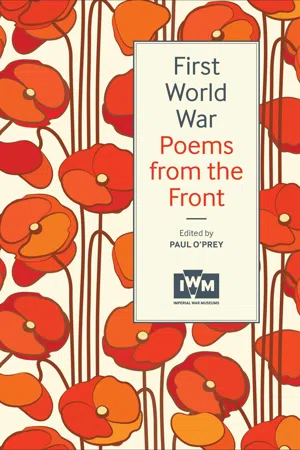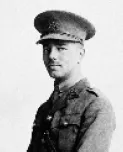
- 176 pages
- English
- ePUB (mobile friendly)
- Available on iOS & Android
eBook - ePub
First World War Poems from the Front
About this book
From the worst horrors of modern trench warfare a small handful of soldiers and nurses created a body of poetry that is so vivid and intense that one hundred years later it has engraved itself on our national consciousness. This anthology focuses on those poets who were on the front line, from the famous Sassoon, Owens and Graves, to nurses like Vera Brittain. The poems are accompanied by a brief and accessible introduction, which sets the context for a reader new to the poems, as well as short biographical profiles of the poets.
Information
Wilfred Owen
1893 – 1918

Wilfred Owen grew up in Birkenhead and Shrewsbury, the son of a railway official. Frustrated in his attempts to win a scholarship to pay for university studies, his first employment was as a lay assistant to the Vicar of Dunsden. Owen had a close relationship with his mother, a devout Evangelical Christian, but he began to lose his own faith and in 1913, partly because of ill health, moved to south-west France to work as a teacher.
He returned to England in 1915 and enlisted with the Artists’ Rifles. He was later commissioned into the Manchester Regiment and went to France at the end of December 1916. In May 1917 he was diagnosed as suffering from shell shock. He was sent for treatment to Craiglockhart Hospital, where he met Siegfried Sassoon, who was to have a significant influence on the way he wrote about the war. Owen returned to active service and in September 1918 was back at the front. He showed exceptional courage in the final advance on German lines and was awarded the Military Cross.
Owen was killed one week before the war ended, shot while crossing the Sambre and Oise Canal on a raft. His poems were first published in book form two years later, together with a Preface that he himself had drafted: ‘Above all I am not concerned with Poetry. My subject is War, and the pity of War. The Poetry is in the pity.’
Anthem for Doomed Youth
What passing-bells for these who die as cattle?
– Only the monstrous anger of the guns.
Only the stuttering rifles’ rapid rattle
Can patter out their hasty orisons.
No mockeries now for them; no prayers nor bells;
Nor any voice of mourning save the choirs, –
The shrill, demented choirs of wailing shells;
And bugles calling for them from sad shires.
What candles may be held to speed them all?
Not in the hands of boys but in their eyes
Shall shine the holy glimmers of goodbyes.
The pallor of girls’ brows shall be their pall;
Their flowers the tenderness of patient minds,
And each slow dusk a drawing-down of blinds.
1914
War broke: and now the Winter of the world
With perishing great darkness closes in.
The foul tornado, centred at Berlin,
Is over all the width of Europe whirled,
Rending the sails of progress. Rent or furled
Are all Art’s ensigns. Verse wails. Now begin
Famines of thought and feeling. Love’s wine’s thin.
The grain of human Autumn rots, down-hurled.
For after Spring had bloomed in early Greece,
And Summer blazed her glory out with Rome,
An Autumn softly fell, a harvest home,
A slow grand age, and rich with all increase.
But now, for us, wild Winter, and the need
Of sowings for new Spring, and blood for seed.
Apologia pro Poemate Meo
I, too, saw God through mud, –
The mud that cracked on cheeks when wretches smiled.
War brought more glory to their eyes than blood,
And gave their laughs more glee than shakes a child.
Merry it was to laugh there –
Where death becomes absurd and life absurder.
For power was on us as we slashed bones bare
Not to feel sickness or remorse of murder.
I, too, have dropped off Fear –
Behind the barrage, dead as my platoon,
And sailed my spirit surging light and clear
Past the entanglement where hopes lay strewn;
And witnessed exultation –
Faces that used to curse me, scowl for scowl,
Shine and lift up with passion of oblation,
Seraphic for an hour; though they were foul.
I have made fellowships –
Untold of happy lovers in old song.
For love is not the binding of fair lips
With the soft silk of eyes that look and long,
By Joy, whose ribbon slips, –
But wound with war’s hard wire whose stakes are strong;
Bound with the bandage of the arm that drips;
Knit in the webbing of the rifle-thong.
I have perceived much beauty
In the hoarse oaths that kept our courage straight;
Heard music in the silentness of duty;
Found peace where shell-storms spouted reddest spate.
Nevertheless, except you share
With them in hell the sorrowful dark of hell,
Whose world is but the trembling of a flare
And heaven but as the highway for a shell,
You shall not hear their mirth:
You shall not come to think them well content
By any jest of mine. These men are worth
Your tears. You are not worth their merriment.
Dulce et Decorum Est
Bent double, like old beggars under sacks,
Knock-kneed, coughing like hags, we cursed through sludge,
Till on the haunting flares we turned our backs
And towards our distant rest began to trudge.
Men marched asleep. Many had lost their boots
But limped on, blood-shod. All went lame; all blind;
Drunk with fatigue; deaf even to the hoots
Of tired, outstripped Five-Nines that dropped behind.
Gas! GAS! Quick, boys! — An ecstasy of fumbling,
Fitting the clumsy helmets just in time;
But someone still was yelling out and stumbling,
And flound’ring like a man in fire or lime...
Dim, through the misty panes and thick green light,
As under a green sea, I saw him drowning.
In all my dreams, before my...
Table of contents
- Cover
- Title
- Copyright
- Contents
- Introduction
- Rupert Brooke
- Charles Sorley
- Robert Graves
- Siegfried Sassoon
- Mary Borden
- Geoffrey Studdert Kennedy
- Edward Thomas
- David Jones
- Isaac Rosenberg
- Vera Brittain
- Wilfred Owen
- Laurence Binyon
- Edmund Blunden
- May Cannan
- Ivor Gurney
- Bibliography and text sources
- Acknowledgements
Frequently asked questions
Yes, you can cancel anytime from the Subscription tab in your account settings on the Perlego website. Your subscription will stay active until the end of your current billing period. Learn how to cancel your subscription
No, books cannot be downloaded as external files, such as PDFs, for use outside of Perlego. However, you can download books within the Perlego app for offline reading on mobile or tablet. Learn how to download books offline
Perlego offers two plans: Essential and Complete
- Essential is ideal for learners and professionals who enjoy exploring a wide range of subjects. Access the Essential Library with 800,000+ trusted titles and best-sellers across business, personal growth, and the humanities. Includes unlimited reading time and Standard Read Aloud voice.
- Complete: Perfect for advanced learners and researchers needing full, unrestricted access. Unlock 1.4M+ books across hundreds of subjects, including academic and specialized titles. The Complete Plan also includes advanced features like Premium Read Aloud and Research Assistant.
We are an online textbook subscription service, where you can get access to an entire online library for less than the price of a single book per month. With over 1 million books across 990+ topics, we’ve got you covered! Learn about our mission
Look out for the read-aloud symbol on your next book to see if you can listen to it. The read-aloud tool reads text aloud for you, highlighting the text as it is being read. You can pause it, speed it up and slow it down. Learn more about Read Aloud
Yes! You can use the Perlego app on both iOS and Android devices to read anytime, anywhere — even offline. Perfect for commutes or when you’re on the go.
Please note we cannot support devices running on iOS 13 and Android 7 or earlier. Learn more about using the app
Please note we cannot support devices running on iOS 13 and Android 7 or earlier. Learn more about using the app
Yes, you can access First World War Poems from the Front by Paul O'Prey in PDF and/or ePUB format, as well as other popular books in History & World War I. We have over one million books available in our catalogue for you to explore.